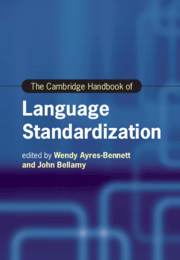Book contents
- The Cambridge Handbook of Language Standardization
- cambridge handbooks in language and linguistics
- The Cambridge Handbook of Language Standardization
- Copyright page
- Contents
- Figures
- Tables
- Contributors
- Introduction
- Part I Revisiting Models and Theories of Language Standardization
- Part II Legitimacy, Authority and the Written Form
- Part III Norms, Literacy and Education
- 14 Language Endangerment and Standardization
- 15 Indigenous Languages, Standardization and Curricular Development
- 16 Polynomic Standards
- 17 Standard Languages and Standardization in the Context of Bilingual Education
- 18 Setting Standards for Language Learning and Assessment in Educational Contexts
- Part IV Beyond the National
- Part V Standardization in Late Modernity
- Name Index
- Subject Index
- References
16 - Polynomic Standards
The Enactment of Legitimate Variation
from Part III - Norms, Literacy and Education
Published online by Cambridge University Press: 01 July 2021
- The Cambridge Handbook of Language Standardization
- cambridge handbooks in language and linguistics
- The Cambridge Handbook of Language Standardization
- Copyright page
- Contents
- Figures
- Tables
- Contributors
- Introduction
- Part I Revisiting Models and Theories of Language Standardization
- Part II Legitimacy, Authority and the Written Form
- Part III Norms, Literacy and Education
- 14 Language Endangerment and Standardization
- 15 Indigenous Languages, Standardization and Curricular Development
- 16 Polynomic Standards
- 17 Standard Languages and Standardization in the Context of Bilingual Education
- 18 Setting Standards for Language Learning and Assessment in Educational Contexts
- Part IV Beyond the National
- Part V Standardization in Late Modernity
- Name Index
- Subject Index
- References
Summary
This chapter explores plural or ‘polynomic’ standards, with special emphasis on the case of Corsica, where a polynomic standard is officially enshrined in Corsican language policy and practice. The principle of ‘polynomy’ is the mutual recognition, by all speakers and writers, of the legitimacy of all varieties of Corsican. Nowhere is this more visible than in orthographic standards, where there is a baseline of sound-to-spelling conventions to be used by writers to write as they speak. The chapter begins with a comparison of the Corsican case with the handful of other contexts in which variant spelling standards are legitimated. The discussion continues with polynomy in school contexts, where the polynomic standard for Corsican is visible to students in allof their Corsican textbooks, but is actively taught to varying degrees. The standard also exists in maximal contrast with French standard language ideology and practice that shapes most of these students’ schools. The chapter then analyses the ‘banal polynomy’ of public signage and webpages in both the public and private sphere, before closing with a critical assessment of the ways in which a polynomic standard both enables and constrains social actors, and its implications for how a minority language is defined and used.
- Type
- Chapter
- Information
- The Cambridge Handbook of Language Standardization , pp. 442 - 469Publisher: Cambridge University PressPrint publication year: 2021

